Please note: This post may contain affiliate links that at no additional cost to you, I may earn a small commission. I only recommend products I would use myself and all opinions expressed here are my own.
Different people need different activities to feel like they’re effectively practicing self-care. What makes me feel good may not be the same thing that makes you feel good. That’s why it’s important to understand what self-care means to you!
That’s also why knowing the 10 types of self-care is so useful. In fact, understanding this has helped me arrange my self-care into different categories. This then makes it way easier to start incorporating self-care in my life through a variety of different self-care activities.
I truly believe that knowing about these types of self-care can help you include more self-care in your life too. Scroll down to discover these 10 types of self-care and the different examples of self-care activities you can do based on each pillar!
Why is it important to know the types of self-care?
1. It will keep you mindful
Approaching life mindfully and intentionally will give you a deeper insight into your own personal identity and growth. When you’ve got these self-care categories in the back of your mind, you can develop a sense for what areas of your life – and identity – need to be nourished the most at any given time. Developing that ability is priceless to your long-term wellbeing.
2. It helps you stay balanced
Finding balance when you’re practicing self-care is a lot easier when you take these different types of self-care into account, especially over the long-term.
Having a holistic and balanced approach to self-care is key to nourishing yourself as a whole person. It’s about prioritising your overall well being and being really intentional with the actions you take for self-care.
3. It creates a variety of opportunities for self-care
A lot of people know they need self-care, but don’t know how to do it. I should know, I used to be one of them! In fact, that’s how I discovered the concept of self-care pillars or self-care categories in the first place.
Knowing these types has made it so much easier for me to come up with self-care strategies for myself. Now I have a bunch of different self-care ideas ready for whenever I need them, and for whichever areas in my life I need it the most.
The 10 types of self-care
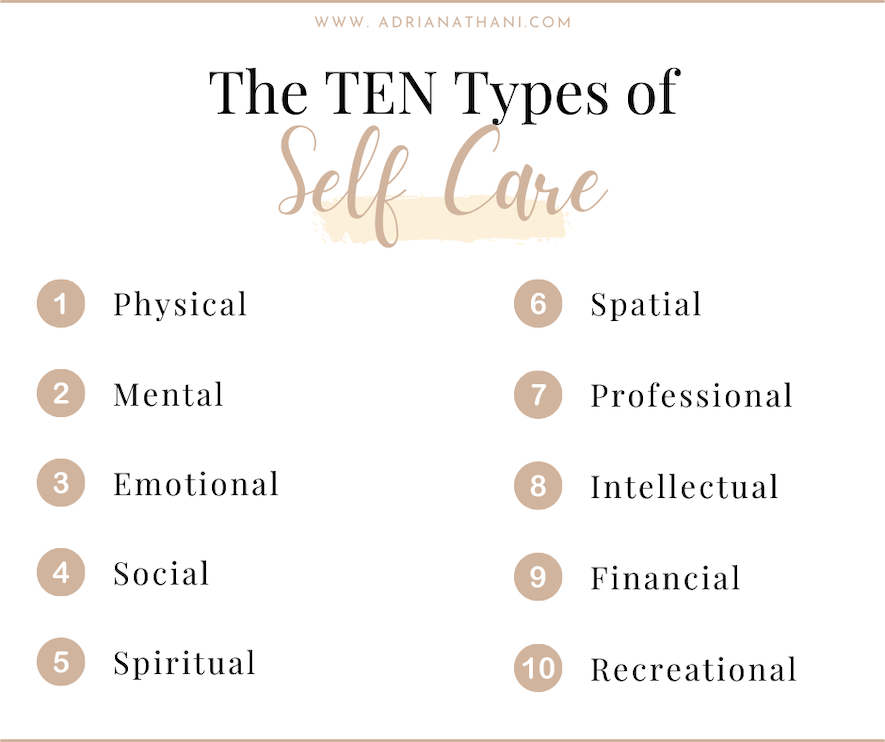
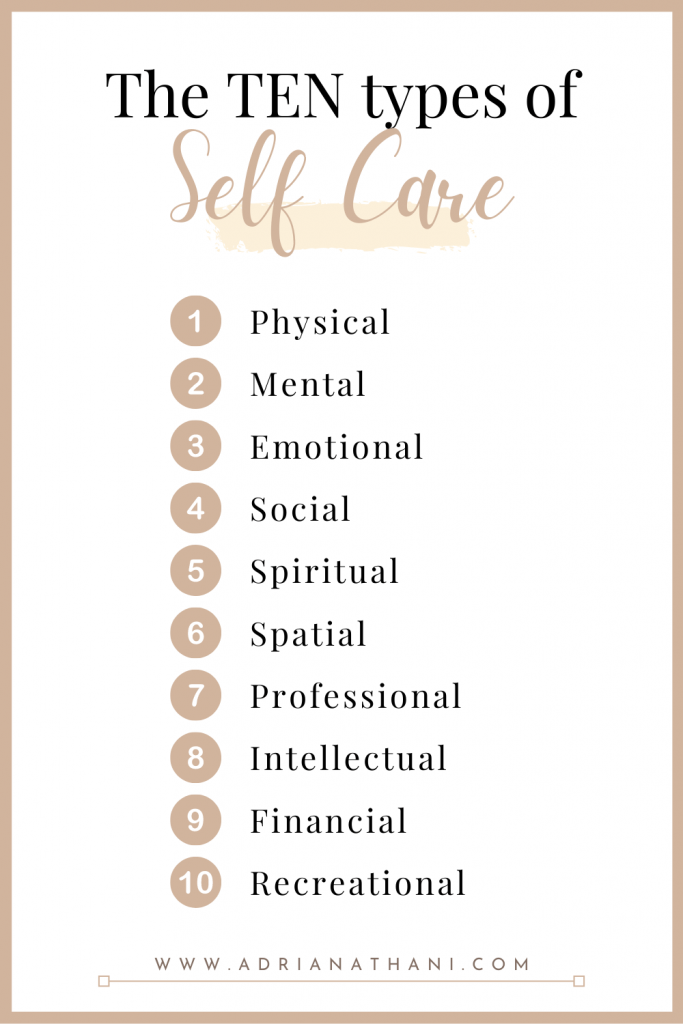
So what are the different types of self-care? Well, these different dimensions of self-care encompass the many areas of your life and facets of your identity that may require nurturing from time to time.
Whenever you feel yourself starting to burn out or feel overwhelmed, take a moment to consider which pillar of self-care might need your attention in that moment, and do something about it! Over time, you’ll develop a self-care routine that will help you achieve more balance and clarity in your life.
1. Physical self-care
This is an easy one, and the one most people will think of when you say the words ‘self-care’! I acknowledge that this is a pretty popular type of self-care, but I also look forward to other types of self-care being normalised too.
Physical self-care includes all the activities that you do to ensure your body is healthy and well. This includes physical movement, healthy sleep habits, and balanced nutrition.
When you prioritise this pillar of self-care, you feel like a well-oiled machine. Your energy levels rise and you feel more physically healthy and strong. You find that you’re sick less often, and even when you do feel unwell, it’s never more than just a few days.
Here are a few examples of physical self-care:
- Drink enough water every day (I always have my Fressko water bottle nearby so I can sip on water throughout the day)
- Get at least 8 hours of sleep each night
- Exercise at least 3 times a week
- Eat plenty of fruits and vegetables
- Use sunscreen every day!
2. Mental self-care
This pillar of self-care, for me personally, is often neglected. That’s why one of my goals for this year is taking better care of my mental health! And after everything that happened last year, I think we could all start prioritising this type of self-care a little bit more.
Mental self-care includes activities that help you maintain your mental wellbeing. This encompasses any activity that helps you practice gratitude, maintain a positive mindset, and address mental health issues.
When you prioritise mental self-care, you’ll develop mental resilience and an inner strength to overcome the challenges of each day. There’s a special kind of confidence when you realize you’re mentally capable of taking anything on!
Here are some self-care practices that help nourish your mental health
- Practice positive affirmations everyday
- Start a gratitude journal and write in it every night. My Curation Planner by Saint Belford has a section especially for a gratitude list every week – use code ADRIANA for 10% off your purchase!)
- See a mental health specialist to address underlying issues (or just maintain good mental health!)
- Begin your day with meditation
- Take frequent breaks at work
3. Emotional self-care
If you’re in your 20s or 30s, I think you’ll agree that emotional regulation isn’t something we grew up knowing. I, for one, have strived to do better with this in raising my kids to understand emotions, label them, and develop healthy emotional responses to challenging situations.
However, even though I’m somewhat grown, I still find my inner child protesting against daily injustices in a way that isn’t healthy in the long run.
Emotional self-care requires confronting your less-than-desirable coping habits and unpacking them so you can start to develop healthier responses. It’s about approaching your emotions with compassion and understanding, allowing you to be better able to handle setbacks more calmly and effectively.
Emotional self-care sometimes looks like this:
- Giving yourself a time out during conflict to cool off
- Reflecting on your emotions with a trusted friend or partner during calm moments
- Writing about your feelings in a journal
- Forgiving yourself for past mistakes
- Practicing mindfulness in your daily life to stay tuned in to your emotional needs
- Learning to develop emotional intelligence (this TedX talk but Ramona Hacker is a good start)
4. Social self-care
I don’t know about you, but my social life has transformed dramatically in the last year. Being in lockdown for weeks and months on end has meant that most of my social interactions happen online. I am far from being the only one who’s going through this, I’m sure.
That being said, even if I’m not encountering IRL social situations that I used to pre-pandemic, I still require social self-care to feel content. Humans are built for being social and we gain a lot of happiness from feeling like part of a community. Developing and nurturing social connections is at the core of who we are!
Here are some examples of social self-care:
- Have a deep, meaningful conversation with a close friend
- Set healthy boundaries with the people in your life
- Unplug from technology during face-to-face conversations
- Stay romantic with your partner even when life gets busy
- Surprise a friend or family member with a small gift
- Create a healthy social media experience for yourself

5. Spiritual self-care
For some, spiritual self-care is closely tied to religion. But religion isn’t the only way to practice spiritual self-care. There are many things we can do every day to nourish our spirit that doesn’t require worship.
I think life is beautifully complex, and spiritual fulfillment is one of the ways we can feel less alone in this world. It’s about finding your purpose in life, a bigger reason for why you exist and the role you can play (and the legacy you’ll leave) in your time here on Earth.
Here are some examples of spiritual self-care:
- Start your mornings with meditation and/or prayer
- Stay active in your community through volunteering
- Spend time in nature – no tech allowed!
- Do a random act of kindness
- Engage with people who are different from you
6. Spatial self-care
Spatial self-care is all about creating an environment that supports and motivates you. It’s about cultivating an energy that works for you in any space you spend a considerable amount of time in. It’s also a chance for you to set cues around your space to support what you do most in those spaces!
So if you need your desk space to be free of clutter in order to start work with a clear mind, do that. If you need 100 cushions to feel comfy on your couch when winding down for bed (like me), do that. Make your spaces work for you.
Here are a few other examples of spatial or environmental self-care:
- Clean up your work desk at the end of each day
- Set up a scented candle or diffuser that suits the space and its function
- Display your favourite artwork
- Create your own decor – there are so many DIY ideas out there!
- Make sure there’s some kind of greenery in your space
- Invest in your comfort (like with ergonomic chairs or a really good bed)
7. Professional self-care
If you have a job of any kind, you know that there’s deep satisfaction in continuously improving yourself at work. I find that investing into your career growth isn’t just great at work, it also makes you a better person overall.
Depending on your line of work, professional self-care might even be something that your workplace can financially support. At the very least, you can claim it as a deductible expense come tax time. Just saying!
Anyway, here are some examples of occupational self-care that has the added bonus of getting you ahead in your career:
- Set realistic goals for your career and keep track of them
- Attend networking events
- Connect with at least one new work contact each week
- Form supportive friendships with colleagues that you get along with
- Read industry or trade publications from time to time
- Join a course that will help you develop your career or specific skill set
- Don’t check on work emails outside of work hours
8. Intellectual self-care
Professional and intellectual self-care are similar in some ways, but I’ve decided to set them apart. Here’s the key reason: while both types of self-care will help you develop and grow, the main purpose of each is different.
Professional self-care should directly impact your career, while intellectual self-care should impact your own personal growth and understanding of the world.
There are people in my life who continue to inspire me. These are the types of people I can have long and meaningful conversations with. Conversations that never fail to inspire me to do better and dream bigger.
What do they all have in common?
They all prioritise intellectual self-care.
Here are some ways you can invest in your own intellectual self-care too:
- Read personal development and other non-fiction books
- Watch inspirational Ted Talks
- Listen to educational podcasts
- Learn a new language
- Challenge yourself to learn something new every day, even if it’s just a quick summary on Wikipedia
9. Financial self-care
I started on my journey of financial literacy a few years ago, and I honestly feel a lot less stressed about money than I used to be! Financial self-care is all about prioritising and planning your finances so that you can have peace of mind.
I feel the need to point out that financial self-care isn’t necessarily about becoming wealthier or increasing your savings. It’s more about improving your mindset around money and actually addressing issues with your finances before they become a big problem.
Here are a few examples of things you can do for financial self-care:
- Read personal finance books
- Listen to personal finance podcasts
- Pay off your AfterPay and ZipPay balances, then delete them from your life
- Create a strategy to reduce your credit card debt
- Identify your money story and what wealth means to you – write it in a journal!
- Download a budgeting app like Pocketbook so you can analyse your financial habits
- Celebrate all your money wins by listing them down in your journal
- Have an honest chat about finances with your partner and/or friends – let’s normalise this!
10. Recreational self-care
This is one of my favourite types of self-care, but I’ll be completely honest here – it’s often the first type of self-care to go when I’m busy! This is unfortunate, because recreational self-care is all about hobbies and interests, and can create a lasting impact on your happiness.
Having a hobby isn’t just a great outlet for you to have fun and de-stress. It also makes you a more interesting and well-rounded person (among other benefits). Plus, there are social aspects to pretty much any hobby that help you practice a bit of social self-care too!
I know that as a knitter, for example, I’ve attended numerous knitting groups and met new people at yarn markets. I also find that I’m constantly challenging myself to learn new skills and try new yarn from time to time. It’s a hobby that truly brings me joy in many ways, beyond just being able to make pretty things for myself and my family.
No matter what your specific hobbies and interests are, here are a few recreational or hobby-related self-care examples you can start practicing:
- Schedule in time for your hobbies every day or every week
- Join IRL or online communities to connect with other hobbyists
- Commit to developing a new hobby-related skill with each project
- Read about the history of your hobby or watch shows about it (my hubby is a gamer and really enjoyed the documentary series on Netflix called High Score, for example)
- Encourage and support new members of your hobby community
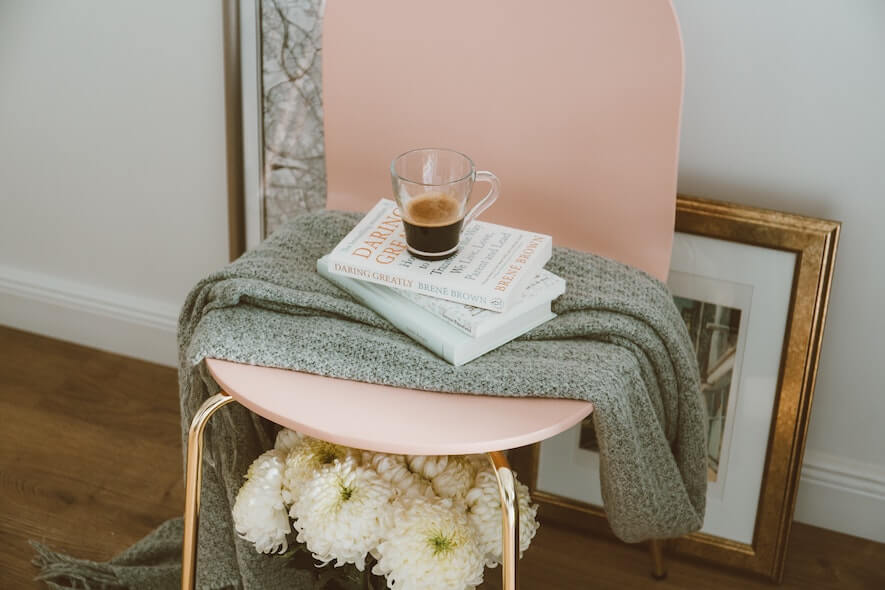
More self-care ideas based on these categories of self-care
If you’re looking to create a self-care routine for yourself, I’ve got you covered!
I understand how tough it is to find time for self-care in our everyday lives, which is why I’ve chosen 100 self-care activities that only take 5-15 minutes to do, and popped them all into my FREE eBook, “100 Quick And Easy Self-Care Ideas For Busy Women”.
When you download the eBook, you’ll also receive my Self-Care Checklist printable where you can list down your favourite quick and easy self-care activities. It’s a great way to create a self-care plan for yourself. This checklist is divided into 10 sections based on these self-care categories, so you’ll end up with a variety of self-care activities you can do when you’ve got 5, 10, or 15 minutes to spare!
Click below or keep scrolling to download the eBook and printable.
Click here to download the FREE eBook and printable.
Self-care is self love
I urge you to start using self-care as a way to protect your well being and nurture a more mindful approach to your life, and I sincerely hope that the self-care tips I’ve shared can help you with that.
Remember, every part of you is worthy of self-care. And some self-care activities may work better for you compared to others, so take the time to discover what really resonates with you. Just make sure to have some fun with it!
Want more self-care ideas right in your inbox? Subscribe to my email list to get inspiration content about personal growth, productivity, and self-care every fortnight. Plus, if you sign up now, you’ll get a copy of “100 Quick And Easy Self-Care Ideas For Busy Women” and the bonus Self-Care Checklist printable right away:

Subscribe now!
You'll receive a FREE eBook - "100 Quick And Easy Self-Care Ideas For Busy Women" - as well as a Self Care Checklist printable. You'll also get empowering content in your email inbox every two weeks.
No junk mail here!
Thank you!
You have successfully signed up for my fortnightly newsletter. You'll receive an e-mail with your free eBook and printable shortly!
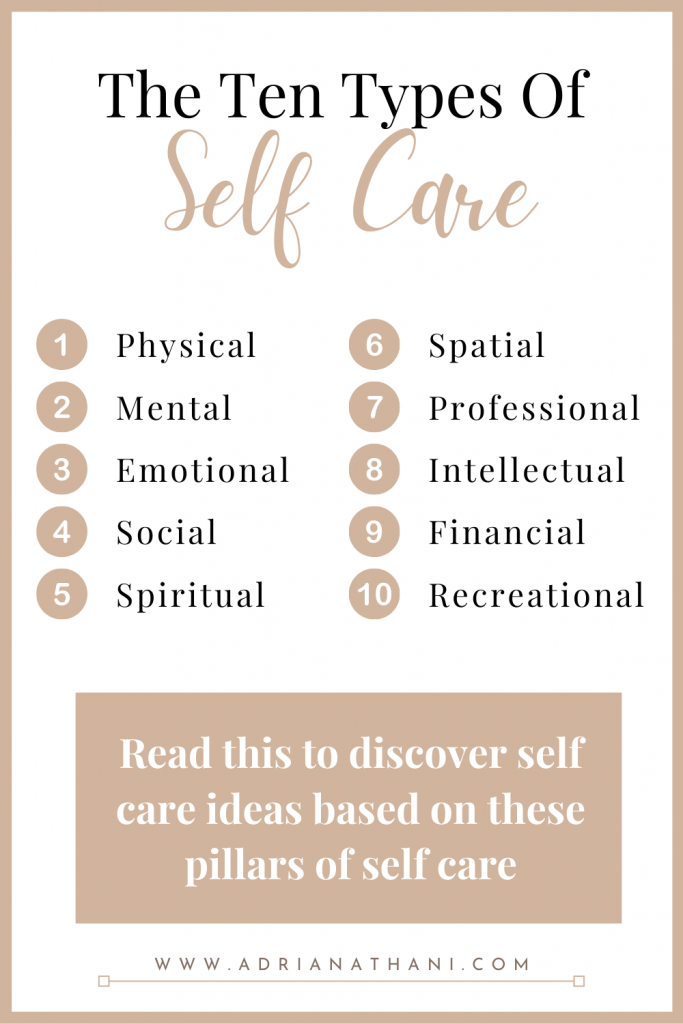
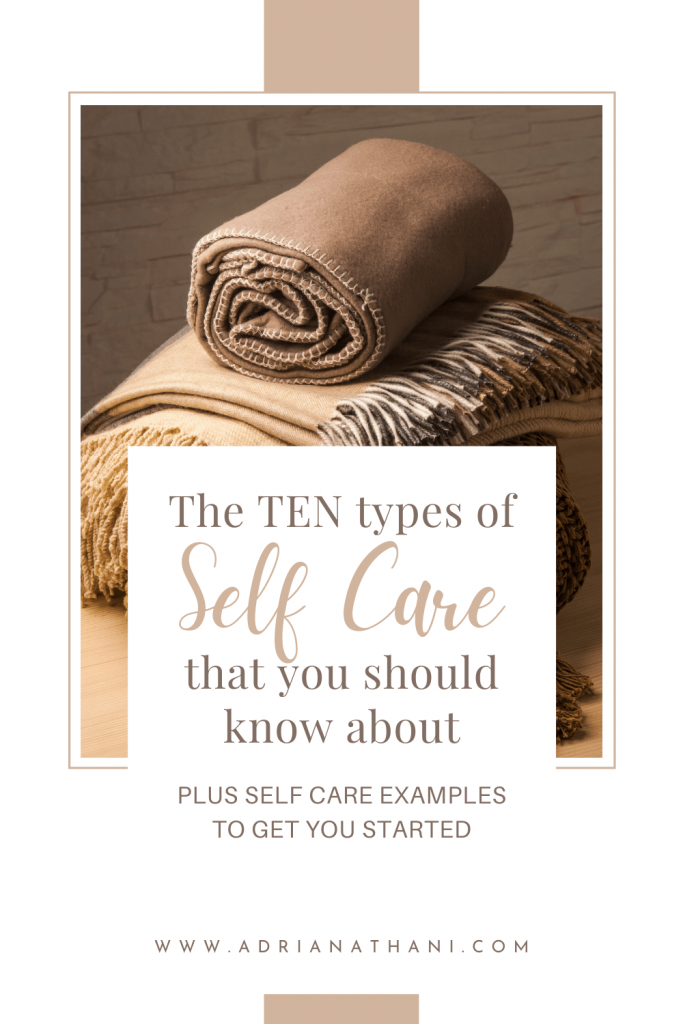
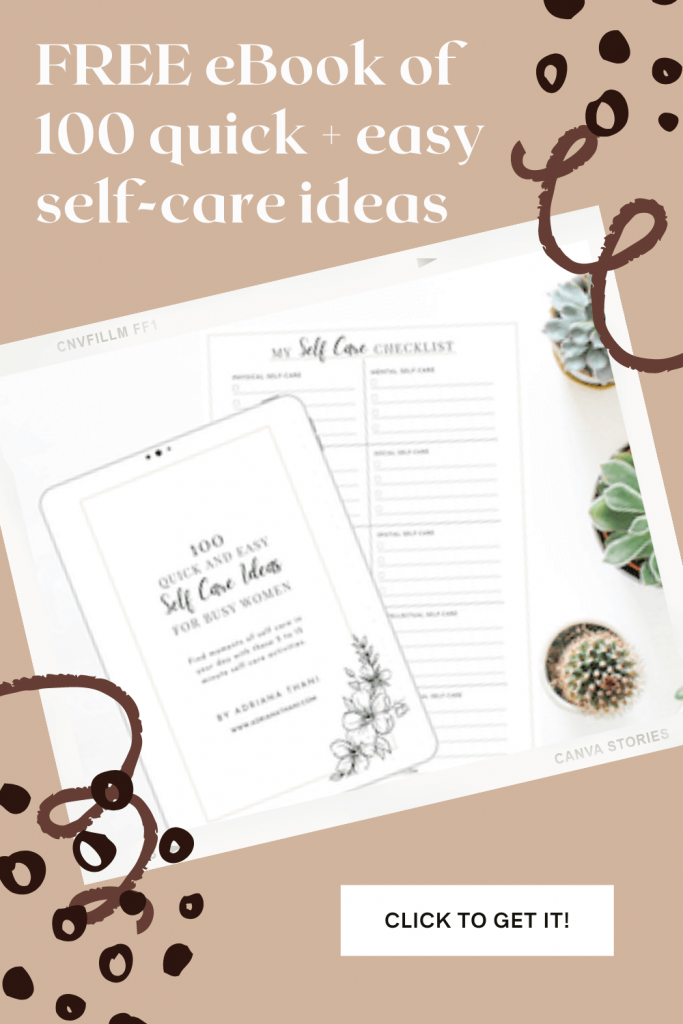
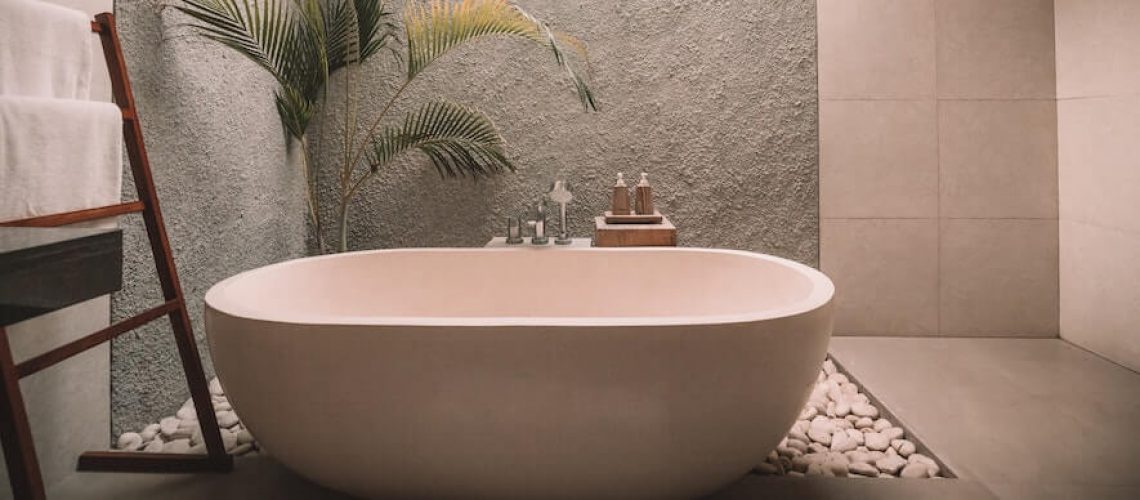



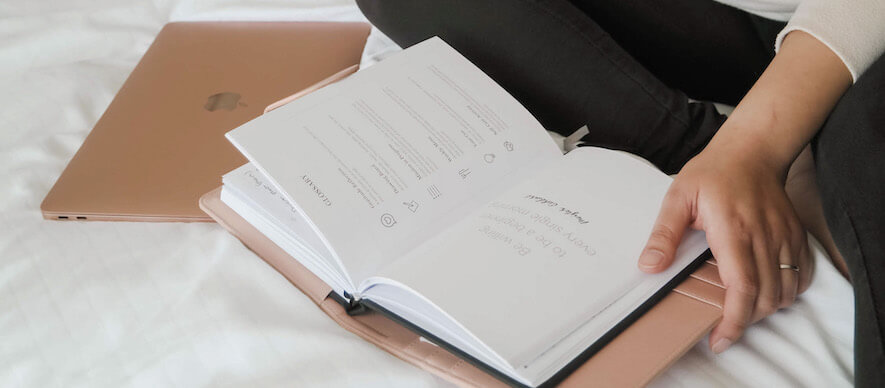
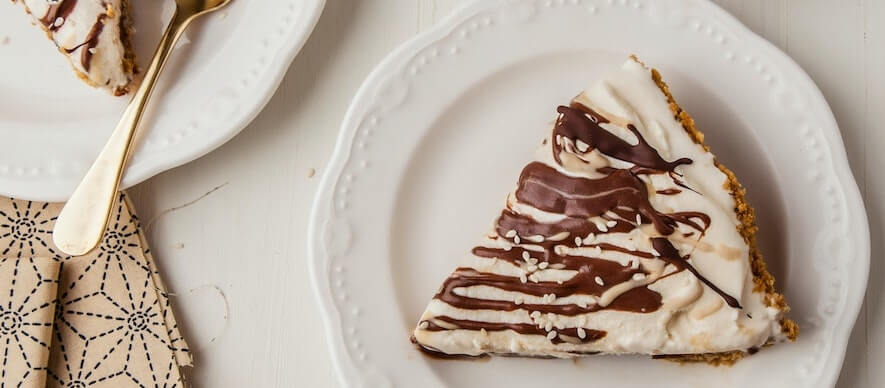

16 thoughts on “10 Types Of Self-Care & How To Practice Them”
Absolutely loved reading this. Sometimes it’s as simple as being told it’s what you need to do that really motivates you to take better care of yourself. Thank you.
That’s exactly right, Elle! It definitely requires more conscious effort for some of us to remember to practice self-care every day.
– Adriana
This is such a great post, you really cover it all! I believe life is about balance and this is exactly what I take from this post, love it!
Thanks, Stephanie! Balance is definitely something I’m more mindful of as I get older, and this just helps in guiding me to do that 🙂
– Adriana
This is very interesting… It made me want to download your list of 100 ideas to practise self-care! I never realised there were so many different types of self-care, thanks for sharing this 🙂
Oh how lovely! Thank you! I do hope you enjoy the eBook. It wasn’t till I started taking my self-care seriously that I started researching the types of self-care. I’m just happy to share what I learned 🙂
– Adriana
Oh my goodness, I love that you included spatial self-care! I’ve never really seen that before, but I absolutely need more spatial self-care in my life. Today, I’m going to pick up, finally throw away my (very dead) Valentine’s Day flowers, and clean the floors.
It’s probably one of the most impactful types of self-care for me personally! I didn’t even recognise the impact of my space on my mental health till I was in my 30s, if I’m being honest. But now it’s something I am really conscious of. Messy house = messy mind, so I just try and be on top of it as much as I can!
P.S: As it happens, I need to clean the floors today too haha
– Adriana
I loved this post! There are so many ways to practice self-care! Your breakdown of each one was awesome.
Thanks, Gayle! I honestly didn’t even know there were these many types of self-care till I looked into it for myself, haha. Happy to share what I’ve learned with you xx
– Adriana
This is such an amazing post! Self care is so underrated and your tips are great for learning how to practice it within your own life.
Thanks, Adam! Self-care is definitely something a lot of us neglect. I’m just trying to do my part to remind folks that it’s vital to leading a happy, healthy life 🙂
– Adriana
I love this! I must admit I tend to think mainly of physical and mental self care. I do quite a few things in the other categories already, but hadn’t really thought of them as being self care. I will from now on and will try some of the other ideas. Thanks for sharing 🙂
I think it’s great that you’re already practicing self-care, whether or not you realise it’s self-care! I really hope the ideas help inspire more self-care moments in your life xx
– Adriana
Self care is so important! I know I neglect this part of my life since its hard to take care of myself when there is so much to do. Thank you for sharing these great reminders!
I totally relate, Ann! I know how hard it is to make time for self-care with all of life’s obligations, but I sincerely hope the quick and easy self-care ideas in my eBook can help you find little moments here and there x
– Adriana